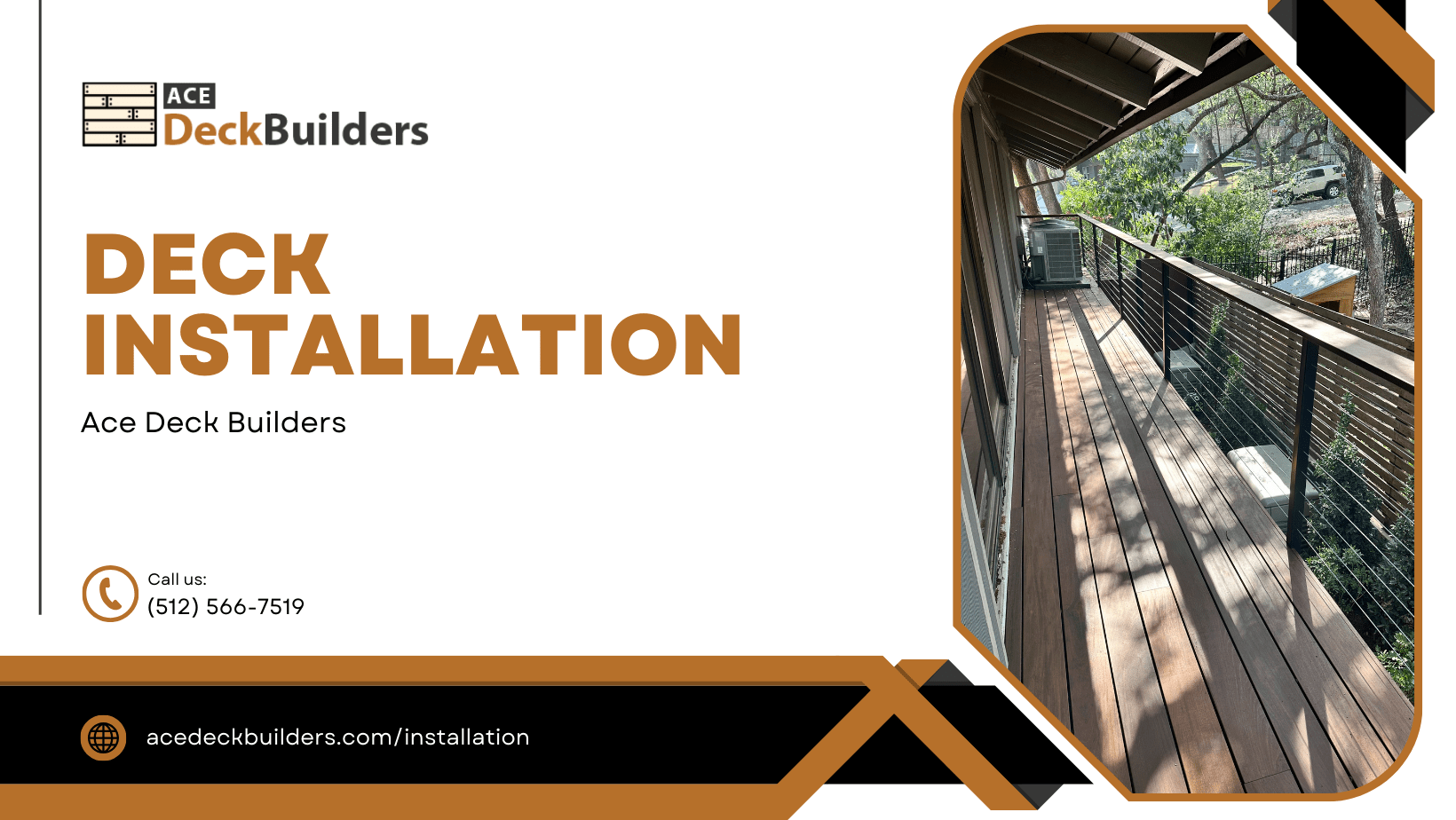

In Austin, deck installation is more than just a construction project—it’s an investment in your outdoor lifestyle. Ace Deck Builders offers skilled craftsmanship and custom designs that bring homeowners' visions to life. They start with your goals and space, then build a plan tailored to fit both aesthetics and functionality.
Decks are available in various materials to suit preferences—from traditional wood for a timeless look to composite options that require minimal upkeep. Every element is considered, from stairs and railings to lighting and layout, ensuring the final result adds comfort and style to your backyard.
Throughout the process, the team keeps you informed and the project on schedule. With Ace Deck Builders, you get a partner who takes pride in delivering exceptional, long-lasting decks.
When it comes to deck installation in Austin, the hot and often humid climate means selecting materials that can withstand the elements is crucial. Beyond durability, sustainability has become a key consideration for homeowners who are looking to reduce their environmental footprint. Sustainable decking materials are those that have minimal impact on the environment, both in their production and throughout their lifecycle.
Traditionally, wood has been the go-to material for deck building due to its natural look and feel. However, not all wood is created equal in terms of sustainability. Hardwoods like Ipe or Teak are long-lasting but are often sourced from rainforests, raising concerns about deforestation. Alternatively, domestically grown woods such as cedar or redwood offer a balance between durability and eco-friendliness since they come from managed forests with strict reforestation programs.
Composite decking is a modern alternative made from a blend of wood fibers and recycled plastics. This material provides the aesthetic appeal of wood without the high maintenance requirements. Composites resist rotting, warping, and insect damage which makes them an ideal choice for Austin's climate while also being eco-friendly due to their use of recycled materials.
Bamboo is gaining popularity as a decking material because it's highly sustainable due to its rapid growth rate. Unlike trees that can take decades to mature, bamboo can be harvested every three to five years without causing damage to the ecosystem. As a material for decks in Austin, bamboo offers resilience against weathering while also providing an exotic aesthetic.
Metal might not be the first material that comes to mind for decking but aluminum has distinct advantages when it comes to sustainability. It’s incredibly durable, requiring little maintenance over its lifespan which can span multiple decades. Additionally, aluminum is completely recyclable without loss of quality; thus it can be continually reused with minimal environmental impact.
Rubber pavers represent an innovative solution made from recycled tires – a product that would otherwise end up in landfills. These pavers are resilient against moisture and temperature fluctuations making them suitable for outdoor spaces like decks around Austin homes. They also contribute towards waste reduction and can easily be removed or replaced as needed.
Choosing sustainable materials for your deck installation isn't just about purchasing; it's also about maintenance and end-of-life considerations. For any decking material you choose—be it wood or composite—it's essential to follow eco-friendly practices when cleaning or disposing of waste products related to your deck upkeep so you maintain consistency with your initial intent of having a low-impact outdoor living space.

Starting a deck installation project in Austin without a thorough plan is like navigating through Texas Hill Country without a map. It's essential to outline your design, choose materials suited for the local climate, and obtain any necessary permits. Detailed planning helps prevent hasty decisions that can lead to costly mistakes and ensures that your deck complies with local building codes.
The sweltering Austin sun and occasional heavy rains demand that you select materials capable of withstanding these conditions. Opt for quality decking materials designed for durability, such as treated lumber or composite decking, which can handle the extreme weather without succumbing to rot or mold.
Ensuring proper spacing between boards is crucial for drainage and expansion, especially during those scorching Texas summers when materials are likely to expand. Additionally, sizing your deck appropriately to accommodate your expected usage while keeping it proportional to your home will maintain aesthetic appeal and functional utility.
In deck construction, a solid foundation is just as important as any visible feature. Inadequate footings or piers can cause the deck to shift or collapse. Make sure they're installed below the frost line if applicable and securely anchored into the ground to provide stable support for years of enjoyment.
A low-maintenance deck might cost more upfront but can save time and money down the line. Investing in pre-treated wood resistant to insects and decay, or easy-care alternative materials like composites can mitigate future repair needs. Think about long-term care requirements when selecting railings, fasteners, and finishes as well.
Finally, underestimating the value of local expertise is a common mistake. Austin has specific zoning laws and building codes tailored for its unique environment. Consulting with professionals who specialize in deck installations in Austin ensures compliance with regulations while also tapping into knowledge on what works best in this particular regional context.
Yes, TrexPro� certified installers such as Texas Deck Builders specialize in Trex deck systems.
Trex decking offers a 25-year limited residential fade and stain warranty.
Most local contractors provide free consultations and estimates.
Trex is a high-performance composite decking that is low-maintenance and long-lasting, ideal for the Austin climate.
Average cost ranges from $25 to $60 per square foot depending on the material (wood vs. composite) and complexity.